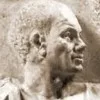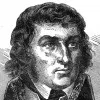Use both ends of the pencil if you hope
to write what gets read twice.[Saepe stilum vertas, iterum quae digna legi sint
scripturus.]Horace (65-8 BC) Roman poet, satirist, soldier, politician [Quintus Horatius Flaccus]
Satires [Saturae, Sermones], Book 1, # 10, “Nempe incomposito,” l. 72ff (1.10.72-73) (35 BC) [tr. Matthews (2002)]
(Source)
The Romans used a stylus to write on waxed tablets; analogous to a modern pencil with eraser, one end of the stylus was pointy to engrave the letters, the other flat to smooth the wax out for revision.
(Source (Latin)). Alternate translations:For nowe, who lookes to beare the bel, his doyngs he muste cull,
At home with hym, and better adde, then he dyd erste out pull.
[tr. Drant (1567)]He that would write what should twice reading stand,
Must often be upon the mending hand.
[tr. A. B.; ed. Brome (1666)]When you design a lasting Piece, be wise,
Amend, Correct, again, again Revise.
[tr. Creech (1684)]Would you a reader's just esteem engage?
Correct with frequent care the blotted page.
[tr. Francis (1747)]Spare not erasion, ye that wish your strain,
When once perused, to be perused again.
[tr. Howes (1845)]You that intend to write what is worthy to be read more than once, blot frequently.
[tr. Smart/Buckley (1853)]Ofttimes erase, if you intend to write what may prove worth a second reading.
[tr. Millington (1870)]Oh yes! believe me, you must draw your pen
Not once nor twice but o'er and o'er again
Through what you've written, if you would entice
The man that reads you once to read you twice.
[tr. Conington (1874)]Often must you turn your pencil to erase, if you hope to write something worth a second reading.
[tr. Fairclough (Loeb) (1926)]You’ll often have to erase if you mean to write something
Worth reading twice.
[tr. Palmer Bovie (1959)]Keep reversing your pencil if you'd like to write a piece
worth reading twice.
[tr. Fuchs (1977)]For you must often
reverse your stylus and revise, if you wish
to write things worthy of being reread.
[tr. Alexander (1999)]If you hope to deserve a second reading you must often employ
the rubber at the end of your pencil.
[tr. Rudd (2005 ed.)]If you want to write what’s worth a second reading,
You must often reverse your stylus, and smooth the wax.
[tr. Kline (2015)]
Quotations about:
rereading
Note not all quotations have been tagged, so Search may find additional quotes on this topic.
Books that children read but once are of scant service to them; those that have really helped to warm our imaginations and to train our faculties are the few old friends we know so well that they have become a portion of our thinking selves.
Few books can please us throughout life. For some we lose all liking as we grow in age, wisdom, or good sense.
[Peu de livres peuvent plaire toute la vie. Il y en a dont on se dégoûte avec le temps, la sagesse ou le bon sens.]
Joseph Joubert (1754-1824) French moralist, philosopher, essayist, poet
Pensées [Thoughts], ch. 23 “Des Qualités de l’Écrivain [Of the Qualities of Writers],” ¶ 178 (1850 ed.) [tr. Attwell (1896), ¶ 375]
(Source)
(Source (French)). Alternate translations:Few books give life-long pleasure. There are some for which, with the growth of time, wisdom, and good sense, we lose all taste.
[tr. Lyttelton (1899), ch. 22, ¶ 84]
Most agree that books worth reading are worth reading more than once.
Holbrook Jackson (1874-1948) English journalist, editor, author
The Anatomy of Bibliomania, Vol. 1, Part 11, ch. 7 “Readers Who Never Weary” (1930)
(Source)
Often misquoted as "... are worth re-reading."
If a book read when young is a lover, that same book, reread later on, is a friend. […] This may sound like a demotion, but after all, it is old friends, not lovers, to whom you are most likely to turn when you need comfort. Fatigue, grief, and illness call for familiarity, not innovation.
There is really no way of considering a book independently of one’s special sensations in reading it on a particular occasion. In this as in everything else one must allow a certain relativity. In a sense, one can never read the book that the author originally wrote, and one can never read the same book twice.
Edmund Wilson, Jr. (1895-1972) American writer, literary critic, journalist
The Triple Thinkers, Foreword (1948 ed.)
(Source)






